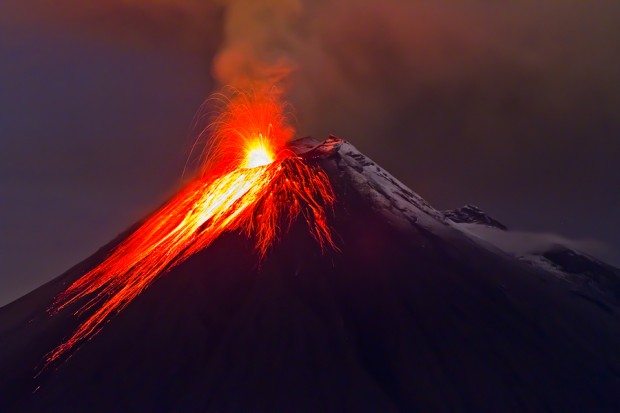Airlines are on alert as one of Iceland’s biggest volcanoes rumbles to life, threatening ash clouds that could force flight cancellations across the North Atlantic, the busiest international travel market.
Air France, Deutsche Lufthansa AG, EasyJet Plc and Delta Air Lines Inc. are among carriers watching the Bardarbunga volcano. Iceland’s Civil Protection Agency began evacuating the area north of the volcano today after deciding yesterday to raise the eruption risk to “orange,” the second-highest level.
The seismic activity raised concern that airlines may face a repeat of the 2010 disruptions when a cloud belched from the Eyjafjallajokull volcano forced carriers to erase more than 100,000 flights and caused about $1.7 billion in lost revenue. Ash is a menace to jetliners because the glass-like particles can stop turbines by melting and congealing.
Airline traffic in Northern Europe would be affected “if the winds, as we’re seeing them today, continue” in an eruption, said Melissa Anne Pfeffer, atmospheric volcanologist at the Icelandic Met Office.
Eurocontrol, the region’s air traffic manager, said there is currently no impact on aviation from the volcano. Bardarbunga lies beneath Vatnajokull, Europe’s largest glacier, and last erupted in 1996. Iceland authorities have recorded about 800 earthquakes in the area since early yesterday.
Tracking Magma
“If the volcano erupts — which we don’t know — how explosive or non-explosive the eruption is depends entirely on where the magma reaches the surface,” Pfeffer said.
Molten rock bubbling up under the icecap would create “a more explosive eruption” with the combination of high heat and a sudden meltdown of frozen water than one that occurs in the open, Pfeffer said.
Investors are monitoring the threat of travel tie-ups in Europe, Helane Becker, a New York-based aviation analyst with Cowen & Co., wrote in a note to clients today.
“We have gotten more than a handful of calls on this subject, and while the potential impact could be significant, it is tough to handicap how this even will play out,” Becker said. “The European airlines have the most exposure to this potential event.”
The three biggest U.S. carriers — American Airlines, United Airlines and Delta — also serve Northern Europe. Representatives for the U.S. airlines and Federal Aviation Administration said operations were continuing as normal while they monitored the volcano.
‘Always Prepared’
“We’re in dialogue with authorities awaiting their directions in case of eruption,” Trine Kromann-Mikkelsen, a spokeswoman for Sweden’s SAS AB, said by e-mail. “We are always prepared for irregularity and have experience from last time.”
The Eyjafjallajokull blowup prompted European officials to close the majority of airspace in the region for six days, stranding 10 million passengers. There was less disruption to travel from a 2011 eruption, which was smaller and only affected airports in Iceland and northern Germany for a few hours.
“Europe is more prepared to deal with volcanic ash these days,” Eurocontrol said in a statement. “We have better mechanisms in place than we did in 2010.”
EasyJet, a Luton, England-based budget carrier, said that in the event of an Bardarbunga eruption, it plans to work with partners including Icelandic officials, planemaker Airbus Group NV, Nicarnica Aviation, which developed technology to detect airborne volanic ash, and FutureVolc, a 26-partner group funded by the European Commission.
Ash Detection
The team will “ensure that ash from it is detected and charted from space, using infrared cameras on European weather satellites or through the potential airborne deployment AVOID technology,” EasyJet said in an e-mailed statement. The acronym refers to the Airborne Volcanic Object Identifier and Detector.
NetJets Inc., the luxury aviation unit of Warren Buffett’s Berkshire Hathaway Inc., has a crew of meteorologists to track disruptive weather and incidents like the 2010 ash cloud, said Christine Herbert, a spokeswoman. During the 2010 flight shutdown, NetJets helped clients relocate outside of the ash zones so they could be picked up in private jets, Herbert said.
“We are watching it, and our customers that may be affected will be advised based on the recommendations of our weather team,” Herbert said by e-mail. “We are in contact with the local authorities so we can react instantly if the situation changes, but at present this is not affecting any operations.”
–With assistance from Andrea Rothman in Toulouse and Thomas Black and Mary Schlangenstein in Dallas.





















 Preparing for an AI Native Future
Preparing for an AI Native Future  Flood Risk Misconceptions Drive Underinsurance: Chubb
Flood Risk Misconceptions Drive Underinsurance: Chubb  Insurance Groundhogs Warming Up to Market Changes
Insurance Groundhogs Warming Up to Market Changes  Modern Underwriting Technology: Decisive Steps to Successful Implementation
Modern Underwriting Technology: Decisive Steps to Successful Implementation 








